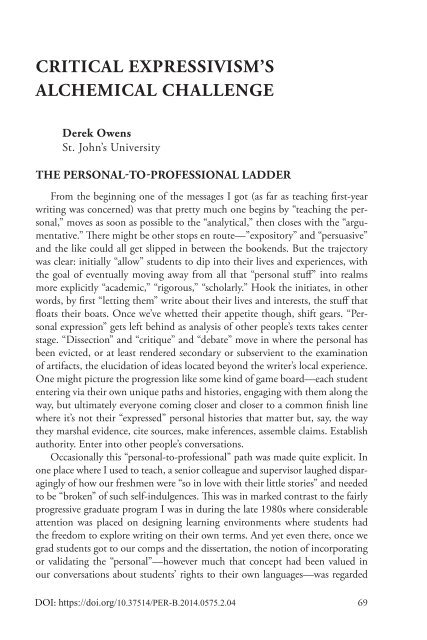Critical Expressivism- Theory and Practice in the Composition Classroom, 2014a
Critical Expressivism- Theory and Practice in the Composition Classroom, 2014a
Critical Expressivism- Theory and Practice in the Composition Classroom, 2014a
You also want an ePaper? Increase the reach of your titles
YUMPU automatically turns print PDFs into web optimized ePapers that Google loves.
CRITICAL EXPRESSIVISM’S<br />
ALCHEMICAL CHALLENGE<br />
Derek Owens<br />
St. John’s University<br />
THE PERSONAL-TO-PROFESSIONAL LADDER<br />
From <strong>the</strong> beg<strong>in</strong>n<strong>in</strong>g one of <strong>the</strong> messages I got (as far as teach<strong>in</strong>g first-year<br />
writ<strong>in</strong>g was concerned) was that pretty much one beg<strong>in</strong>s by “teach<strong>in</strong>g <strong>the</strong> personal,”<br />
moves as soon as possible to <strong>the</strong> “analytical,” <strong>the</strong>n closes with <strong>the</strong> “argumentative.”<br />
There might be o<strong>the</strong>r stops en route—”expository” <strong>and</strong> “persuasive”<br />
<strong>and</strong> <strong>the</strong> like could all get slipped <strong>in</strong> between <strong>the</strong> bookends. But <strong>the</strong> trajectory<br />
was clear: <strong>in</strong>itially “allow” students to dip <strong>in</strong>to <strong>the</strong>ir lives <strong>and</strong> experiences, with<br />
<strong>the</strong> goal of eventually mov<strong>in</strong>g away from all that “personal stuff” <strong>in</strong>to realms<br />
more explicitly “academic,” “rigorous,” “scholarly.” Hook <strong>the</strong> <strong>in</strong>itiates, <strong>in</strong> o<strong>the</strong>r<br />
words, by first “lett<strong>in</strong>g <strong>the</strong>m” write about <strong>the</strong>ir lives <strong>and</strong> <strong>in</strong>terests, <strong>the</strong> stuff that<br />
floats <strong>the</strong>ir boats. Once we’ve whetted <strong>the</strong>ir appetite though, shift gears. “Personal<br />
expression” gets left beh<strong>in</strong>d as analysis of o<strong>the</strong>r people’s texts takes center<br />
stage. “Dissection” <strong>and</strong> “critique” <strong>and</strong> “debate” move <strong>in</strong> where <strong>the</strong> personal has<br />
been evicted, or at least rendered secondary or subservient to <strong>the</strong> exam<strong>in</strong>ation<br />
of artifacts, <strong>the</strong> elucidation of ideas located beyond <strong>the</strong> writer’s local experience.<br />
One might picture <strong>the</strong> progression like some k<strong>in</strong>d of game board—each student<br />
enter<strong>in</strong>g via <strong>the</strong>ir own unique paths <strong>and</strong> histories, engag<strong>in</strong>g with <strong>the</strong>m along <strong>the</strong><br />
way, but ultimately everyone com<strong>in</strong>g closer <strong>and</strong> closer to a common f<strong>in</strong>ish l<strong>in</strong>e<br />
where it’s not <strong>the</strong>ir “expressed” personal histories that matter but, say, <strong>the</strong> way<br />
<strong>the</strong>y marshal evidence, cite sources, make <strong>in</strong>ferences, assemble claims. Establish<br />
authority. Enter <strong>in</strong>to o<strong>the</strong>r people’s conversations.<br />
Occasionally this “personal-to-professional” path was made quite explicit. In<br />
one place where I used to teach, a senior colleague <strong>and</strong> supervisor laughed disparag<strong>in</strong>gly<br />
of how our freshmen were “so <strong>in</strong> love with <strong>the</strong>ir little stories” <strong>and</strong> needed<br />
to be “broken” of such self-<strong>in</strong>dulgences. This was <strong>in</strong> marked contrast to <strong>the</strong> fairly<br />
progressive graduate program I was <strong>in</strong> dur<strong>in</strong>g <strong>the</strong> late 1980s where considerable<br />
attention was placed on design<strong>in</strong>g learn<strong>in</strong>g environments where students had<br />
<strong>the</strong> freedom to explore writ<strong>in</strong>g on <strong>the</strong>ir own terms. And yet even <strong>the</strong>re, once we<br />
grad students got to our comps <strong>and</strong> <strong>the</strong> dissertation, <strong>the</strong> notion of <strong>in</strong>corporat<strong>in</strong>g<br />
or validat<strong>in</strong>g <strong>the</strong> “personal”—however much that concept had been valued <strong>in</strong><br />
our conversations about students’ rights to <strong>the</strong>ir own languages—was regarded<br />
DOI: https://doi.org/10.37514/PER-B.2014.0575.2.04<br />
69


















